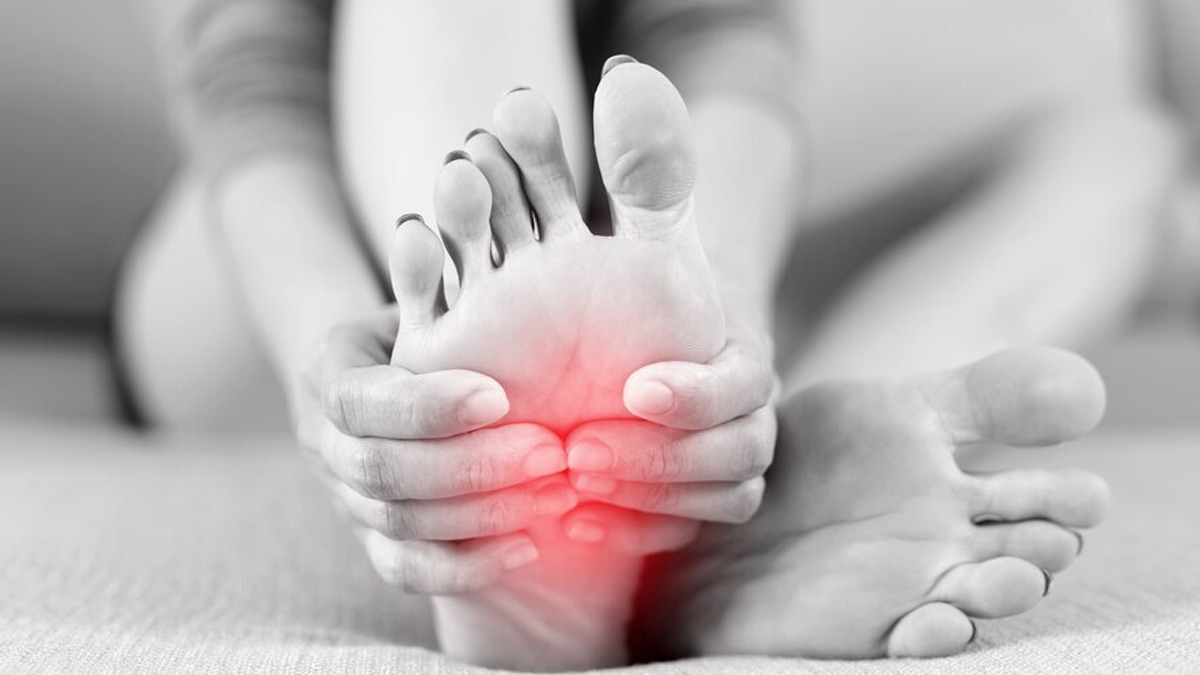
Peripheral neuropathy is a condition that affects the nerves outside the brain and spinal cord. These nerves control movement, sensation, and touch throughout the body. While there's no cure for peripheral neuropathy, there are ways to manage the symptoms and improve your quality of life.
Table of Content:-
According to research led by The Procter and Gamble Company and published in the Journal of Clinical & Experimental Pharmacology, taking a daily pill with vitamins B1, B6, and B12 for 3 months helped people with peripheral neuropathy in three major major:
- Improved their reflexes in the ankles and knees.
- Made their muscles stronger.
- Helped them feel things better in their toes and fingers.
To understand how B vitamins help ease the symptoms of Peripheral Neuropathy, the Onlymyhealth team spoke to Dr PN Renjen, Senior Consultant, Neurology, Indraprastha Apollo Hospitals, Delhi.

What Causes Peripheral Neuropathy?
The National Institute of Neurological Disorders and Stroke states that peripheral neuropathy happens when the nerves outside your brain and spinal cord get damaged. Imagine these nerves as your body's information highways, carrying messages between your brain and the rest of your body. When these highways are damaged, the messages don't get through as clearly.
This damage can cause a variety of problems, depending on which nerves are affected. Here's a breakdown of what can happen:
- Numbness and Tingling: Damaged nerves might not send any signals at all, leading to numbness. Sometimes, they might send mixed-up signals, causing a tingling or prickling sensation.
- Pain: Nerve damage can also lead to sharp, burning, or throbbing pain.
- Weakness and Balance Problems: When the messages to your muscles are weak or unclear, it can make them harder to control. This can lead to weakness, clumsiness, and difficulty balancing.
What causes this damage? There are many culprits, including:
- Diseases: Diabetes is a common cause of peripheral neuropathy. Other conditions like autoimmune diseases and infections can also be culprits.
- Vitamin Deficiencies: A lack of B vitamins can contribute to nerve damage.
- Injuries: Trauma or accidents can damage nerves directly.
- Toxins: Exposure to certain toxins, like heavy metals or alcohol, can damage nerves over time.
- Medications: Some medications can have nerve damage as a side effect.
Also Read: Diabetic Neuropathy: Warning Signs Of The Most Common Type Of Peripheral Neuropathy

How Do B Vitamins Boost Nerve Health?
B vitamins are a group of eight essential nutrients that play crucial roles in various bodily functions, including nerve health. Dr Renjen shared that the three main B vitamins that help with peripheral neuropathy are B1 (thiamine), B6 (pyridoxine), and B12 (cobalamin).
“They support reduce oxidative stress, nerve regeneration, reduce inflammation, enhance myelin sheath integrity, and improve neurotransmitter synthesis. These effects collectively contribute to better nerve signal transmission, which can alleviate symptoms such as pain, numbness, and weakness commonly experienced by neuropathy patients,” said Dr Renjen.
The mechanism by which B vitamins help with neuropathy symptoms is multifaceted. Dr Renjen explained:
- Thiamine: Enhances nerve conduction velocity and supports energy metabolism in nerve cells.
- Pyridoxine: Acts as a cofactor in neurotransmitter synthesis, improving signal transmission.
- Cobalamin: Vital for maintaining myelin sheath integrity and promoting nerve regeneration.

Sources Of Vitamin B
If you are dealing with peripheral neuropathy, Dr Renjen listed some ways by which you can improve your B Vitamin intake:
- Consume B vitamin-rich foods such as whole grains, lean meats, fish, eggs, dairy products, leafy greens, and legumes.
- Some patients may benefit from B-complex supplements or even high-dose supplementation, particularly for B12.
- In some cases, intramuscular B12 injections may be necessary for optimal absorption.
“It's crucial that patients consult with their neurologist before starting any supplementation regimen, as we need to carefully monitor B vitamin levels and adjust intake accordingly. While B vitamins are generally safe, it's important to note that excessive intake can lead to side effects,” stipulated Dr Renjen.
He continued, “Paradoxically, very high doses of B6 (>200mg daily) can worsen neuropathy. Some patients may experience rare allergic reactions, skin rashes, or gastrointestinal disturbances with high doses. There's also the potential for drug interactions, particularly with certain anticonvulsants and antibiotics.”
Also Read: Peripheral Neuropathy: Natural Remedies To Treat Numbness And Pain
Peripheral neuropathy can be a debilitating condition. While B vitamins alone aren't a cure, research suggests they can play a role in managing symptoms and improving nerve function. This may lead to better reflexes, improved motor strength, and ultimately, a better quality of life. However, consulting a doctor for diagnosis, treatment plan development, and B vitamin dosage is crucial. Remember, a holistic approach combining B vitamins, lifestyle modifications, and proper medical management offers the best chance of regaining strength and walking taller with peripheral neuropathy.
Also watch this video
How we keep this article up to date:
We work with experts and keep a close eye on the latest in health and wellness. Whenever there is a new research or helpful information, we update our articles with accurate and useful advice.
Current Version